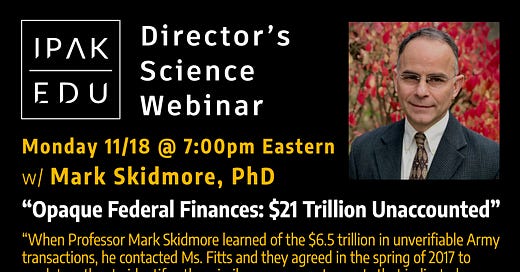IPAK-EDU Director’s Science Webinar
Monday 11/18 @ 7:00pm Eastern
with/ Mark Skidmore, PhD
“Opaque Federal Finances: $21 Trillion Unaccounted”
Excerpt from Should We Care about Secrecy in Financial Reporting?
On October 7, 2016 Reuters published an article by Scot Paltrow (2016), which reported that in fiscal year 2015 the Army made $6.5 trillion in unsupported accounting adjustments “to create an illusion that its books were balanced.” Given that the Army general fund budget in that year was $122 billion, this was an astounding revelation. Though the article highlighted ongoing accounting problems within the Department of Defense (DOD), Paltrow tried to alleviate public concerns about the enormous unsupported adjustments with the following statement:
At first glance the adjustments totaling trillions may seem impossible. The amounts dwarf the Defense Department’s entire budget. Making changes to one account also requires making changes to multiple levels of sub-accounts, however. That created a domino effect where, essentially, falsifications kept falling down the line. In many instances this daisy chain was repeated multiple times for the same accounting item.
Though the massive $6.5 trillion figure raised eyebrows, the story quickly faded from public view. The original government report upon which Paltrow based his article comes from the Office of the Inspector General (OIG). The document “Army General Fund Adjustments Not Adequately Documented or Supported” (2016) concluded that the problems were attributed to “control deficiencies.” While the report did not receive much additional attention from the media, it did catch the eye of former Assistant Secretary of Housing and Urban Development, Catherine Austin Fitts. Ms. Fitts had been tracking similar unsupported adjustments in the Departments of Housing and Urban Development (HUD) and the Department of Defense (DOD) for nearly twenty years. Fitts became interested in the issue because she had become aware of financial impropriety within HUD many years prior.
The DOD made major media headlines many years earlier for its accounting problems on September 10, 2001 when Secretary of Defense Donald Rumsfeld stated in a Congressional hearing (C-SPAN, 2014) that the DOD had lost track of $2.3 trillion in transactions. At the time, Mr. Rumsfeld said:
According to some estimates, we cannot track $2.3 trillion in transactions. We cannot share Information from floor to floor in this building because it’s stored on dozens of technological systems that are inaccessible or incompatible.
-Remarks as Delivered by Secretary of Defense Donald H. Rumsfeld, The Pentagon, Monday, September 10, 2001
This acknowledgement made news headlines on that day, but was forgotten a day later when the tragedy of 9/11 captured the attention of the entire world. DOD accounting problems also found their way into the media during the Iraq War, but have largely remained out of public view for more than a decade.
When Professor Mark Skidmore learned of the $6.5 trillion in unverifiable Army transactions, he contacted Ms. Fitts and they agreed in the spring of 2017 to work together to identify other similar government reports that indicated unusually large unverifiable transactions within HUD and DOD. Over the course of the next six months, Skidmore, Fitts and a small team of graduate students collected official government documents wherein a total of $21 trillion in undocumentable transactions were identified during the 1998-2016 period.1
Read more at Lighthouse Economics
Once a week, this webinar series brings a focus to science as it applies to public issues of concern. The webinar brings to you expertise from scientists, researchers, data analysts, medical professionals, health advocates, attorneys, and more, all with the opportunity to learn, ask questions, and hear directly from people working at the leading edge.
Join us!
If you like what you see, and you’re willing and able, consider leaving a tip. Thank you!
Keep reading with a 7-day free trial
Subscribe to Twisting Strands to keep reading this post and get 7 days of free access to the full post archives.





